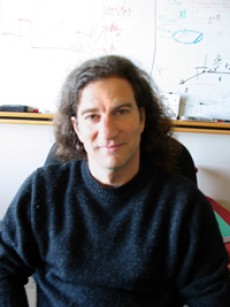LBNL Mathematician James Sethian Elected to National Academy of Engineering
February 14, 2008
James Sethian, head of the Mathematics Group at the U.S. Department of Energy’s Lawrence Berkeley National Laboratory and a professor of mathematics at the University of California at Berkeley, has been elected to the National Academy of Engineering.
Sethian was one of 65 new members and nine foreign associates whose election was announced Friday, February 8. Sethian was honored “for the development of efficient methods of tracking moving interfaces.”
Sethian’s research has led to the development of level set methods, which are numerical techniques that can follow the evolution of interfaces, as well as a host of other techniques to track interfaces in various settings. These interfaces can develop sharp corners, break apart, and merge together. The techniques have a wide range of applications, including problems in fluid mechanics, combustion, manufacturing of computer chips, computer animation, image processing, structure of snowflakes, and the shape of soap bubbles.
“Prof. Sethian is truly deserving of this honor, which reflects his mathematical contributions to solving problems across a wide range of areas,” said LBNL Associate Laboratory Director for Computing Sciences Horst Simon, who is also Director of the Computational Research Division, where Sethian’s group resides. “Applied math research is an essential component of our computational science program, and the research by James and his group has contributed to advancements not only at Berkeley Lab but at research organizations across the country and around the world.”
Academy membership honors those who have made outstanding contributions to “engineering research, practice, or education, including, where appropriate, significant contributions to the engineering literature,” and to the “pioneering of new and developing fields of technology, making major advancements in traditional fields of engineering, or developing/implementing innovative approaches to engineering education.”
Sethian received his Ph.D. in Applied Mathematics at the University of California, Berkeley in 1982, with a dissertation analyzing theoretical and numerical aspects of the numerical approximation of moving curves and surfaces in combustion modeling. He followed with a National Science Foundation postdoctoral fellowship at the Courant Institute of Mathematics, and then returned to UC Berkeley as an Assistant Professor in 1985. He is currently Vice Chair for Undergraduate Affairs and Professor in the Department of Mathematics. In addition, he serves as the leader of the Mathematics Group at the Lawrence Berkeley National Laboratory.
Sethian is the author of many scientific articles and books, and serves as an editor on several journals. He is the recipient of numerous prizes and awards, including the 2004 Norbert Wiener Prize in Applied Mathematics, which is awarded every three years jointly by the American Mathematical Society (AMS) and the Society for Industrial and Applied Mathematics (SIAM), for his work on level set methods and other applications.
For more about James Sethian’s work, visit http://math.berkeley.edu/~sethian/. For more about Berkeley Lab’s Computational Research Division, which creates computational tools and techniques that enable scientific breakthroughs by conducting applied research and development in computer science, computational science, and applied mathematics, go to http://crd.lbl.gov.
About Computing Sciences at Berkeley Lab
High performance computing plays a critical role in scientific discovery. Researchers increasingly rely on advances in computer science, mathematics, computational science, data science, and large-scale computing and networking to increase our understanding of ourselves, our planet, and our universe. Berkeley Lab’s Computing Sciences Area researches, develops, and deploys new foundations, tools, and technologies to meet these needs and to advance research across a broad range of scientific disciplines.







 Instagram
Instagram YouTube
YouTube